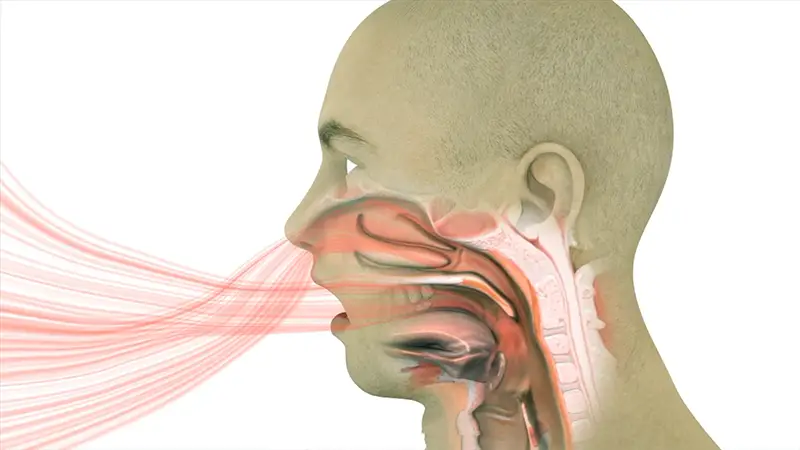Have you ever experienced the unsettling sensation of a burp that leaves a metallic, iron-like taste in your mouth, reminiscent of blood? It’s not only disconcerting but can also be a cause for concern. You might ask ‘Why does my burp taste like blood?’
This perplexing phenomenon raises questions about your body’s signals and health. In this article, we delve into the intriguing world of unexpected flavors in burps, particularly the metallic taste that can mimic the distinct flavor of blood.
Join us as we unravel the mysteries of gastrointestinal health, digestion, and the intricate interactions that occur within our bodies.
Understanding why your burp may taste like blood is not only intriguing but can also provide valuable insights into your well-being. So, let’s embark on this fascinating journey to decipher the enigma of burps with a metallic twist.
Why Does My Burp Taste Like Blood?
One of the most common reasons for experiencing a blood-like taste in burps is your diet. Consuming foods high in iron, such as red meat, can lead to a metallic taste in your mouth, which can be mistaken for blood.
Additionally, if you’ve recently eaten certain foods like spinach, lentils, or other iron-rich sources, this can affect the taste of your burps.
Medications
Some medications, particularly those containing iron supplements or antibiotics, can leave a metallic taste in your mouth. If you’re on medication, this may explain the unusual taste in your burps.
Reflux and Heartburn
Gastroesophageal reflux disease (GERD) and heartburn can cause stomach acid to flow back into your esophagus, leading to a sour or metallic taste in your mouth, resembling blood.
If you frequently experience heartburn, it’s worth considering this as a possible cause of your burp’s taste.
Gastrointestinal Bleeding
On a more concerning note, gastrointestinal bleeding, often associated with conditions like peptic ulcers, gastritis, or even esophageal varices, can result in the taste of blood in burps. If you suspect this may be the cause, consult a healthcare professional immediately.
Infections
Certain infections in the gastrointestinal tract can also lead to unusual tastes in burps. These infections may disrupt the normal functioning of your digestive system, altering the flavors that you experience.
While the occasional blood-like taste in your burps due to dietary choices or medications may not be a cause for alarm, there are instances when it’s essential to consult a healthcare professional. Here are some signs that you should seek medical attention:
Persistent Symptoms
If the taste persists or becomes more frequent over time, it could indicate an underlying issue that needs addressing.
If the taste of blood in your burps is accompanied by other concerning symptoms like vomiting blood, black or tarry stools, unexplained weight loss, or severe abdominal pain, it is crucial to seek immediate medical care.
Medical History
If you have a history of gastrointestinal issues, ulcers, or a family history of such conditions, your risk for more serious causes of a blood-like taste in burps may be higher, warranting a medical evaluation.
To prevent or alleviate the taste of blood in your burps due to dietary or lifestyle factors, consider these tips:
Balanced Diet
Maintain a well-balanced diet with a variety of foods to reduce the likelihood of experiencing unusual tastes in your burps. If you consume iron-rich foods, do so in moderation.
Drinking an adequate amount of water can help with digestion and reduce the likelihood of experiencing reflux or heartburn.
Medication Management
If you’re taking medications that affect your taste, discuss potential side effects with your healthcare provider. They may suggest alternatives or provide strategies to minimize these effects.
Regular dental check-ups and good oral hygiene practices can help prevent oral health issues from impacting the taste of your burps.
How to Get Rid of a Blood Taste in Your Mouth?

If you’ve recently undergone dental procedures like extractions, fillings, or root canals, a residual taste of blood is not uncommon. This can be due to the small amounts of blood that are often present during dental treatments.
Oral Injuries
Accidents or injuries to the mouth, gums, or tongue can lead to bleeding, resulting in a blood taste. Biting your lip, cheek, or tongue can also cause this sensation.
Blood from a nosebleed can sometimes flow into the throat and mix with saliva, creating a blood taste in your mouth.
Gastrointestinal Issues
Digestive problems like acid reflux, gastritis, or peptic ulcers can lead to the regurgitation of stomach acid or blood into the mouth, causing a metallic or blood-like taste.
Some medications can cause a metallic or blood-like taste as a side effect. If you suspect your medication is the cause, consult your healthcare provider.
Underlying Health Conditions
More serious conditions, such as bleeding disorders, liver disease, or cancers of the mouth, throat, or gastrointestinal tract, can result in a persistent blood taste. These cases require immediate medical attention.
Remedies for Getting Rid of a Blood Taste in Your Mouth
Rinse Your Mouth
If the blood taste is mild and related to dental work or a minor injury, a gentle rinse with salt water or an alcohol-free mouthwash can help clear away any residual blood and promote healing.
Mix a teaspoon of salt with warm water, swish it in your mouth for about 30 seconds, and spit it out.
Oral Hygiene
Maintaining good oral hygiene practices is crucial. Brush your teeth and tongue, floss regularly, and use an antibacterial mouthwash to prevent infections and reduce the risk of a persistent blood taste.
Ice Chips
Sucking on ice chips can help alleviate inflammation and numb the affected area. This can be particularly useful for minor injuries or oral surgeries.
Chew Sugar-Free Gum
Chewing sugar-free gum can stimulate saliva production and help wash away any residual blood taste. Be sure it’s sugar-free to avoid exacerbating dental issues.
Over-the-Counter Antacids
If the blood taste is due to acid reflux, over-the-counter antacids can help neutralize stomach acid and alleviate the sensation. Consult with a healthcare provider if you experience frequent heartburn or reflux.
When to Seek Medical Attention?
If the blood taste persists for an extended period without an obvious cause, consult a healthcare provider to rule out underlying health issues.
Accompanying Symptoms
If the blood taste is accompanied by symptoms like vomiting blood, black or tarry stools, unexplained weight loss, severe abdominal pain, or any other concerning signs, seek immediate medical care.
Health Conditions
If you have underlying health conditions, a history of bleeding disorders, or a family history of serious diseases, it’s important to consult a healthcare professional to rule out more severe causes.
Medication-Related
If you suspect your medication is causing the blood taste, consult your healthcare provider to discuss potential alternatives or adjustments.
Can Stress Cause a Taste of Blood in the Mouth?

Stress is a prevalent part of modern life, and its impact on our physical and mental health is well-documented. It can lead to a range of symptoms, from anxiety and muscle tension to digestive issues.
But can stress also cause the taste of blood in the mouth? In this article, we’ll explore the connection between stress and this unusual sensation and discuss how stress might influence your taste perception.
Understanding the Mind-Body Connection
To comprehend how stress can contribute to the perception of a blood taste in the mouth, it’s essential to acknowledge the intricate relationship between the mind and body.
When you’re stressed, your body goes through a series of physiological changes, collectively known as the “fight or flight” response. These changes are part of the body’s adaptive mechanism to help you respond to perceived threats.
One key component of this response is the diversion of blood flow away from non-essential functions, such as digestion, toward vital systems like the muscles and brain.
This redirection of blood flow can affect the digestive system, leading to various symptoms, including changes in taste perception.
Effects of Stress on Taste Perception
Altered Saliva Composition
Stress can affect the composition of saliva. Research has shown that heightened stress levels can lead to changes in saliva’s chemical makeup, potentially influencing the taste of substances in your mouth.
These alterations may contribute to the perception of a metallic or unusual taste, which might be interpreted as a blood-like flavor.
Sensitivity to Existing Tastes
Stress can heighten your sensitivity to tastes and smells. You may become more attuned to subtle flavors in your mouth that you wouldn’t typically notice. This heightened sensitivity could lead to the perception of a metallic or blood-like taste.
Oral Health Impact
Stress can impact oral health in various ways, including increased risk of gum disease, mouth sores, and a reduction in the body’s ability to fight oral infections. These factors can contribute to changes in taste perception, potentially leading to a blood-like taste.
Reflux and Heartburn
Stress can exacerbate gastrointestinal issues like acid reflux or heartburn. When stomach acid regurgitates into the esophagus and mouth, it can create a sour or metallic taste, which may be mistaken for blood.
Addressing Stress-Related Taste Changes
Adopt stress-reduction practices such as deep breathing, meditation, yoga, or mindfulness. These techniques can help manage stress and its impact on your body, potentially reducing the taste changes you experience.
Oral Hygiene
Maintain good oral hygiene to minimize the risk of oral health issues that may contribute to unusual tastes. Regular brushing, flossing, and dental check-ups are essential.
Balanced Diet
Continue to eat a well-balanced diet, even during stressful periods. A nutritious diet can support overall health and prevent taste disturbances related to dietary choices.
FAQs
Can stress cause other unusual tastes in the mouth besides a blood-like taste?
Yes, stress can influence taste perception, potentially leading to various unusual tastes. Some individuals may report experiencing a metallic, sour, or even bitter taste due to stress.
How can I differentiate between stress-related taste changes and a more serious underlying health issue?
Distinguishing between stress-related taste changes and more serious health issues can be challenging. If you’re unsure, it’s advisable to consult a healthcare provider.
Are there specific foods that can help alleviate the taste changes caused by stress?
While there’s no magic food to counteract stress-related taste changes, maintaining a well-balanced diet with a variety of flavors and nutrients can help support overall health, including oral health.
Can stress cause persistent taste changes in the mouth?
Stress-related taste changes are typically temporary and should subside as your stress levels decrease. However, in some cases, persistent taste changes may be a sign of an underlying issue.
Are there specific medications that can help alleviate taste changes caused by stress?
Medications are not typically prescribed to address taste changes related to stress, as these changes are often temporary and related to the body’s response to stress.
Conclusion
The taste of blood in a burp can be attributed to a variety of factors, both benign and concerning.
While common causes include dietary choices, such as the consumption of iron-rich foods or certain medications, it is essential to pay attention to persistent or recurrent occurrences of this metallic taste.
In some cases, it could signal more serious underlying health issues like gastrointestinal bleeding, acid reflux, or even certain infections.
If you’ve been experiencing this taste frequently, it is advisable to consult a healthcare professional for a thorough evaluation. Your overall health and well-being should always be a top priority.
Remember that understanding the source of this peculiar taste in your burps can lead to early detection and timely intervention.
In the end, while a burp that tastes like blood might seem unusual, it serves as a reminder of the intricate ways our bodies communicate with us.
Hi, I’m Mark Pattinson and I’m a freelance personal trainer. I’ve been working in the fitness industry for over 10 years especially since I work with diabetes patients and I love helping people achieve their fitness goals. I believe that everyone can benefit from a good workout, and I’ll do everything to make sure you get the most out of your training.